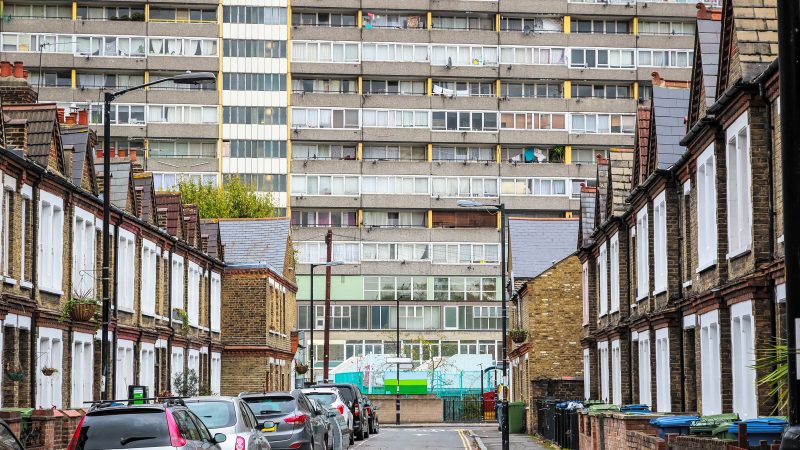
For many of us, the Covid-19 crisis has shown just how important it is to have a safe, secure and decent home. For many, however, the pandemic has been made that much more difficult due to living somewhere that is overcrowded, too expensive or in a bad or even dangerous condition.
The UK faces an ever more desperate housing crisis. We simply are not building enough homes and the homes we have are increasingly out of the financial reach of many. There is broad political consensus that we need to increase our housing stock, with the government stating we need to build 300,000 homes a year.
Social housing once made up a large part of overall new housing supply – the 1945 Labour government created hundreds of thousands of homes, helping to rebuild the economy coming out of the war and transforming people’s lives, lifting them out of overcrowded slums and putting them into comfortable homes with indoor toilets and gardens. Not any longer – in 2019/20, only 6,644 social homes were built, and 24,120 lost from the stock, resulting in a net loss of 17,476 homes.
Our chronic lack of social homes has meant council waiting lists of 1.2 million people and falling rates of homeownership due to rocketing house prices which are out of the reach of many working people. People are instead forced into private renting – paying higher housing costs than any other group, some relying on housing benefits to get through each month, and often receiving an insecure, overcrowded and even dangerous place to live in return.
The government has attempted to tackle this crisis by repeating what has already failed – half-hearted schemes that still rely on the market alone to deliver all the homes we need. Recent changes to building regulations will usher in a new generation of slums through the conversion of commercial properties into unsuitable flats, and proposed changes to our planning system threaten the delivery of the few social homes we currently build.
The last time Britain built enough homes to meet the needs of the population, success hinged on a bold programme of social housing delivery alongside strong private-sector output. We must bring social housing into the mix once again to get us out of the mess our housing system is in.
We need a new vision for housing. Building social housing improves both the affordability and availability of homes. Drawing on the spirit of Labour’s post-war government, a big social housing programme has the potential to provide vital economic growth and skilled jobs. We can build and retrofit energy-efficient homes to fight the climate crisis and meet our net zero targets. In helping people get into stable housing, we can ensure residents put down the roots they need to be part of cohesive, thriving communities.
Any plan for social housing must also look beyond its construction. The inquiry into the Grenfell Tower tragedy has shown a clear thread of neglect by authority figures in the years leading up to the fire. When residents complained that they felt unsafe, they were made to feel like they were the problem. Investment in social housing must be accompanied by better regulation of social landlords and a stronger voice for tenants throughout the system.
Conservative cuts have allowed progress on improving social homes to stall and left families in damp, cold and unsafe homes. Labour’s track record of improving existing housing stock is something to be proud of – after two decades of Conservative neglect, Labour ensured through the Decent Homes Programme that by 2010 1.4 million social homes that did not meet basic standards of decency were brought up to scratch with essential repairs as well as new windows, kitchens and bathrooms.
Despite the programme’s success, the current Conservative government cut all central funding and until 2018, constrained local authorities’ ability to maintain their housing stock through a cap on their borrowing for housing. Half a million social homes are now in a state of disrepair – and worse still, more than 40% of those are classed as unfit for human habitation.
Rising out of the depths of our housing crisis will take strong political will and achievable plans. To build further support, it is vital we continue to make the strong moral, social and economic case for bringing back social housebuilding. But as with all bold plans, we must also detail how its delivery can and should take place. I hope here we can continue the conversation as to how, as we come out of the pandemic, we take on that challenge.
This essay first appeared in a pamphlet, ‘Home Front’, published by the Fabian Society and Shelter.




More from LabourList
Almost half of Labour members oppose plans to restrict jury trials, poll finds
‘How Labour can finally fix Britain’s 5G problem’
‘The University of the Air – celebrating 60 years of Harold Wilson and Jennie Lee’s vision’